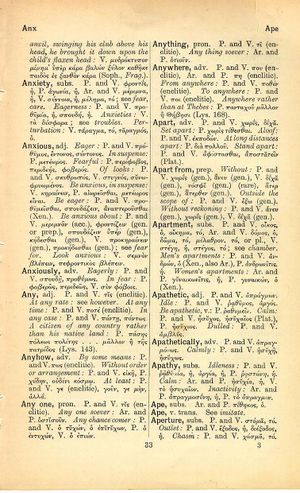any: Difference between revisions
From LSJ
Ὁ δὲ μὴ δυνάμενος κοινωνεῖν ἢ μηδὲν δεόμενος δι' αὐτάρκειαν οὐθὲν μέρος πόλεως, ὥστε ἢ θηρίον ἢ θεός → Whoever is incapable of associating, or has no need to because of self-sufficiency, is no part of a state; so he is either a beast or a god
mNo edit summary |
m (Woodhouse1 replacement) |
||
| Line 1: | Line 1: | ||
{{Woodhouse1 | {{Woodhouse1 | ||
|Text=[[File:woodhouse_33.jpg|thumb|link={{filepath:woodhouse_33.jpg}}]] | |Text=[[File:woodhouse_33.jpg|thumb|link={{filepath:woodhouse_33.jpg}}]] | ||
===adjective=== | |||
P. and V. τις (enclitic). | [[prose|P.]] and [[verse|V.]] [[τις]]; (enclitic). | ||
[[at any rate]]: see [[however]]. | [[at any rate]]: see [[however]]. | ||
[[at any time]]: P. and V. ποτέ (enclitic). | [[at any time]]: [[prose|P.]] and [[verse|V.]] [[ποτέ]]; (enclitic). | ||
[[in any ease]]: P. and V. [[πάντῃ]], [[πάντως]] | [[in any ease]]: [[prose|P.]] and [[verse|V.]] [[πάντῃ]], [[πάντως]] | ||
[[a citizen of any country rather than his native land]]: P. | [[a citizen of any country rather than his native land]]: [[prose|P.]] [[πάσης πόλεως πολίτης… μᾶλλον ἢ τῆς πατρίδος]] (Lys. 143). | ||
}} | }} | ||
Revision as of 09:16, 20 May 2020
English > Greek (Woodhouse)
adjective
at any rate: see however.
at any time: P. and V. ποτέ; (enclitic).
in any ease: P. and V. πάντῃ, πάντως
a citizen of any country rather than his native land: P. πάσης πόλεως πολίτης… μᾶλλον ἢ τῆς πατρίδος (Lys. 143).

